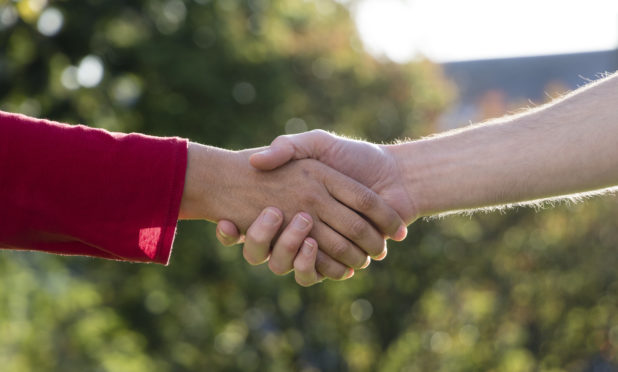Donald Trump may not be the only person who can strike terror into people’s hearts with a single handshake.
Scientists in Tayside have concluded prolonged shakes can trigger anxiety, negatively impact business meetings and affect the state of our relationships.
The team at Dundee University’s School of Social Sciences found extending the act beyond three seconds reduced people’s enjoyment of one-on-one encounters and influenced how often they would laugh.
Dr Emese Nagy, a reader in psychology who led the study, said the findings highlight the importance of first impressions.
“Handshakes are a particularly important greeting and can have long-lasting consequences for the relationships that we form,” she said.
“There has been evidence to suggest that many behaviours, such as hugs, fall within a window of approximately three seconds and this study has confirmed that handshakes that occur in this timeframe feel more natural to those who participate in the greeting.
“While shaking hands for longer may appear to be a warm gesture on the surface, we found that they negatively affected the behaviour of the recipient, even after the handshake was finished.”
For the study, 36 people were interviewed by Masters students about their work and career prospects. The subjects were then introduced to a second researcher, who either shook hands normally (for less than three seconds), for a prolonged period (longer than three seconds), or not at all.
Those who had been on the receiving end of the lengthy handshakes laughed less and showed increased levels of anxiety. Less than three seconds produced fewer smiles, but felt more natural, according to participants.
The American president’s handshakes with other leaders have made headlines for their duration.
He spent 19 seconds on Japanese premier Shinzo Abe, reinforcing his dominance with six pats on the back of the hand.
His encounters with French president Emmanuel Macron have been stranger still. The pair shook hands for an excruciating 25 seconds at the Bastille Day celebrations in 2017 and when they met again at last year’s G7 summit in Canada, Trump was left with white imprints on his hand, due to the firmness of the Frenchman’s grip.
Dr Nagy said the power grabs could be doing more harm than good.
“Politicians are particularly keen on prolonged handshakes, which are often used an expression of warmth but also as a means of demonstrating authority,” she said.
“However, our findings suggest that while doing so might look impressive for the cameras, this behaviour could potentially jeopardise the quality of their working and personal relationships from the beginning, which could have repercussions for millions of people.”
A previous study led by Dr Nagy in 2011 confirmed a hug lasts about as long as many other human actions, suggesting we go through life perceiving the present in a series of three-second windows.
The latest findings have been published in the journal Perceptual and Motor Skills.










